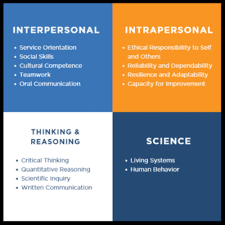Understanding the 15 Core Competencies for Medical School
These 15 core competencies are used to demonstrate that the applicant has developed skills, knowledge, and capabilities in these 15 defined competency areas. The competency categories are as follows: Thinking & Reasoning Competencies, Science Competencies, Interpersonal Competencies, and Interpersonal Competencies. To further understand, please visit the AAMC page.
It is important to keep in mind that medical schools look at more than your grades and scores. They use the 15 Core Competencies to assess your preparedness for medical school. The AAMC highlights different medical students and their unique paths to medical schools on a page called Anatomy of An Applicant, click here to read more about other applicants!
